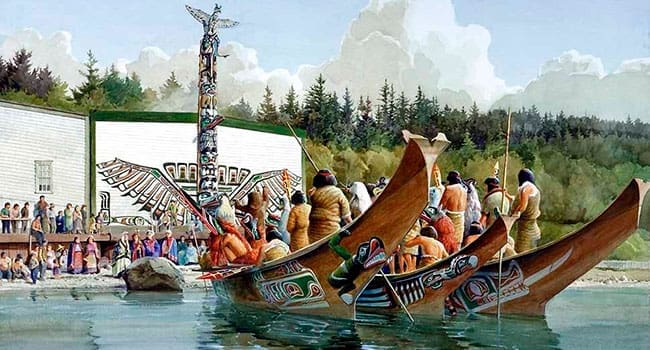 There is a good chance that if you had attended the opening of The Box of Treasures: Gifts from the Supernatural during the period 1885 to 1951, anywhere in Canada, you could have been arrested for attending an event that resembled a potlatch (literally a gift-giving feast).
There is a good chance that if you had attended the opening of The Box of Treasures: Gifts from the Supernatural during the period 1885 to 1951, anywhere in Canada, you could have been arrested for attending an event that resembled a potlatch (literally a gift-giving feast).
Potlatches were the cornerstone of the powerful Kwakwaka’wakw economic and legal system. But during that time, the federal government banned all potlatch ceremonies on the Northwest Coast in a misguided effort to prohibit the annual cycle of gifting and celebration.
Both the government and Christian churches fundamentally misunderstood potlatch practices, especially the payment of guests by the host chief and family, to secure them as witnesses to the rituals performed. In their controlling quest, aided and abetted by the Indian Act, these institutions sought to “civilize” and “assimilate the Indian” into mainstream society. Backed by the rule of law, RCMP officers could arrest potlatch participants, who faced between two and six months’ imprisonment. In 1921, for example, 20 Kwakwaka’wakw men and women were sent to Oakalla Prison in Burnaby for attending Chief Dan Cranmer’s Potlatch in Memkumlis.
The original Potlatch Ban (Section 149 of the Indian Act) stated that:
“Any Indian or other person who encourages, either directly or indirectly an Indian or Indians to get up such a festival or dance, or to celebrate the same, or who shall assist in the celebration of the same, is guilty of a like offence, and shall be liable to the same punishment.”
Clearly, Vancouver’s Bill Reid Gallery is now guilty of encouraging, celebrating or assisting in the same misdemeanour. At a recent potlatch ceremony, songs rang out in Kwak’wala (the language of the Kwakwaka’wakw), drums beat, and dancers danced in the masks of the Red Cedar Bark Ceremonies and the Peace Dances. They followed the intricate rhythms to animate the masks’ spirits, while the host chiefs Robert Joseph and his nephew Beau Dick narrated the ritual events for 360 guests.
Bill Reid Foundation Board Chair Joanne Gassman, CEO Alexandra Montgomery and exhibition Curator Kwiaahwah Jones offered thanks and praise for the owners of the masks, their guardians and the master carvers and assistants who created them for the potlatch cycle.
Two nights before the gallery opening, many of the masks had been danced in a parallel feast, hosted by Beau Dick and master of ceremonies Robert Joseph at the UBC First Nations’ House of Learning. This celebration was held to make the point clear that Kwakwaka’wakw Potlatch masks were never intended to be hung on walls as objets d’art; they were meant to be danced.
Chief Joseph and several others spoke of the need for reconciliation between Canada and the First Nations. Beautiful young First Nations couples dressed in Dorothy Grant design, Kwakwaka’wakw elders in their traditional regalia, and many Northwest Coast artists resident in the lower mainland mingled with a first-night audience of civic philanthropists, politicians, architects, lawyers, actors, artists, religious leaders and environmental activists. The audience reflected the broad cultural diversity of contemporary Vancouver.
One could observe, during the evening, how the practice of a small but growing body of public art galleries reflects a nuanced understanding of political change, power shifts in society, a broadening embrace of indigeneity, and the importance of community celebration of change. The opening night of Box of Treasures: Gifts from the Supernatural was much more than a chichi gallery event for members and friends of the arts. It was rather a statement about how the world has evolved. Attendees acted in the role of witness – just like in the potlatch ritual.
The Kwakwaka’wakw continued potlatching during the federally imposed ban. Cleverly held in remote places that were hard to get to, and presented in weather undesirable for the Indian Agent, the RCMP and Church representatives, the masks were danced and the guests were thanked. Canada has grown because of their principled cultural dissent.
The exhibit runs until September 27 at the Bill Reid Gallery.
Mike Robinson has been CEO of three Canadian NGOs: the Arctic Institute of North America, the Glenbow Museum and the Bill Reid Gallery. Mike has chaired the national boards of Friends of the Earth, the David Suzuki Foundation, and the Canadian Parks and Wilderness Society. In 2004, he became a Member of the Order of Canada.
The views, opinions and positions expressed by columnists and contributors are the author’s alone. They do not inherently or expressly reflect the views, opinions and/or positions of our publication.


